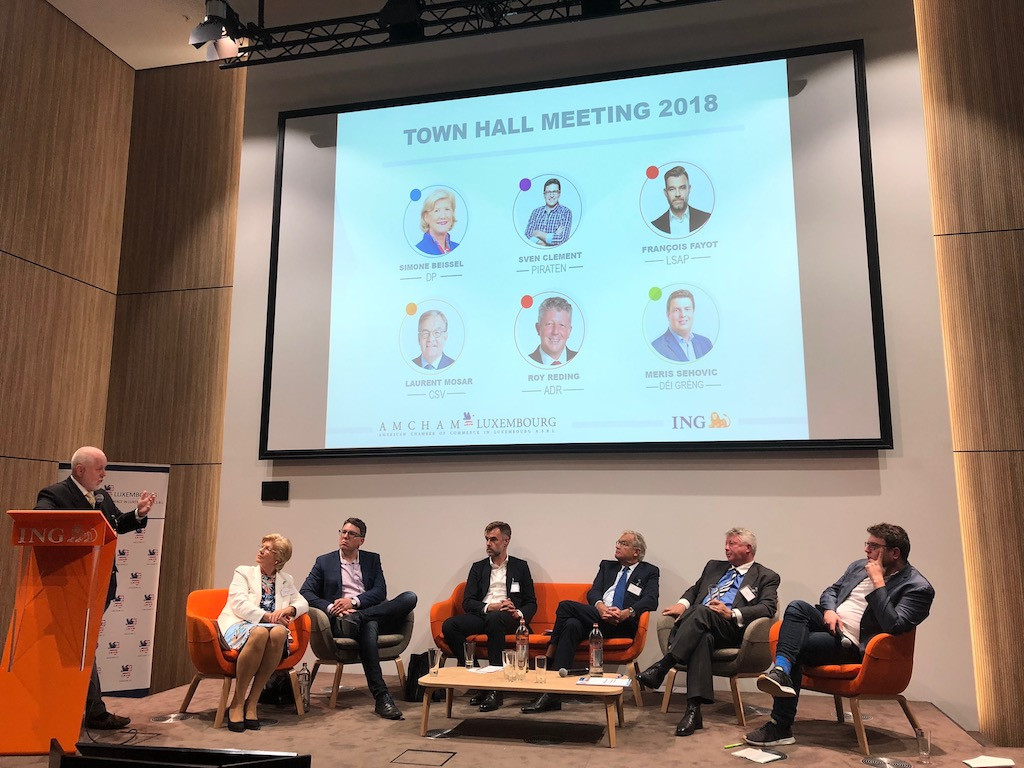An audience eager to hear how Luxembourg’s main political parties aim to the concerns of residents who were not Luxembourg natives flocked into the auditorium at ING House for Amcham’s town hall debate on Thursday 27 September.
The format had become something of a tradition since first introduced by Amcham for the 2012 communal elections. There were few surprises in the candidates' opening statements for anyone who has followed the election campaign. But the debate was lively and provided many first time voters in the audience with a flavour of what the parties stand for.
Luxembourg model
Simon Beissel of the DP explained that the economy under the current government was headed in the right direction. “We want to build on the success of the Luxembourg model and the DP wants to continue to create a very favourable business environment,” she said. Further commitment to green finance, in which Luxembourg is a pioneer, and also the EU internal digital market to put an end to some geo-blocking were also on the DP agenda. And Beissel also cited her party’s commitment to helping work-life balance by encouraging teleworking and expanding parental leave conditions.
President and co-founder of the Pirate party, Sven Clement, said that his party was “at its core a social liberal party, so we are aiming to find a balance between a good social security net and liberal ideas when it comes to social freedoms,” which have a limit when infringing on the freedom of others. Calling for more modernisation, Clement said that Luxembourg is still very much “a crafty old lady” good at making grompererkichelcher and gaardebounen, “but when it comes to the digitalisation of procedures and creating businesses it’s still quite difficult and takes a lot of time.”
Rifkin and wealth distribution
Indeed, red tape was a theme throughout the evening as Amcham CEO Paul Schonenberg, acting as MC, later asked the candidates about speeding up work permits for employees from third countries and the much-promised digital tracking procedures for applications. Most candidates agreed that the procedures need to be improved to maintain the grand duchy's competetiveness in attracting a highly skilled workforce.
Economic growth and its benefits were also raised by Clement, and by other candidates including the LSAP’s Franz Fayot, who cited the Rifkin strategy’s focus on the circular economy and sustainable development as a success of the current regime and of LSAP economy minister Étienne Schneider in particular. But Fayot also recognised that tackling the consequences of growth, especially in the areas of mobility and housing was also important.
He said the LSAP stands for more just distribution of wealth--his party wants to raise the minimum wage by €100 and undertake further tax reforms aimed at helping the poorest members of society. “The recent tax reform has given more economic resources to people by distributing more than €500 million a year, mostly to households,” he said. And Fayot was also proud of the social reforms undertaken by the current government, including changes to the laws on abortion, divorce and LGBT issues.
Taxation and financial services industry
Laurent Mosar, representing the main opposition CSV, said that one of his party’s main priorities would be to balance public finances. He accused the DP-LSAP-Déi Gréng coalition government of failing to mend the roof while the sun shone. The CSV would modernise the current tax system to make Luxembourg even more favourable to companies, while also setting up a system to fight tax evasion and to bring the country’s tax administration into the 21st century. “We also propose so-called tax rulings should be kept to a minimum and never become the rule,” he said. Mosar was keen to point out his party’s support of the financial services industry and said the CSV would promote the green finance and fintech sectors as well as seek further diversification of the fund industry.
Speaking for the ADR, Roy Reding said that “there must be something terribly wrong in this country” if unemployment has only fallen by 4,000 during a period in which 60,000 jobs were created in the private sector. His party would like to “introduce serious taxation” on land designated for building but actually not being used to “give a negative incentive” to landowners. The ADR also wants to abolish local council tax for companies and include it in the general corporate tax, while still providing the communes with the same level of receipts to fund local projects. As a traditional conservative party, Reding pointed out that the ADR also wanted to trim back state spending on what he called “fancy politics” while focusing on the security, health and education of its people. “I am really astonished there is still no association of tax payers in Luxembourg,” he said.
Building on strengths
The final speaker, 26-year old Meris Sehovic from Déi Gréng, said he would not pitch the party’s programme but an idea. “The idea that a bright future, solidarity in our society and good living are possible.” The Greens want to promote smart economic policy combined with progressive and forward ecological policy, which can be Luxembourg’s economic advantage. Sehovic cited the circular economy strategy (“a blueprint for actors all over the world”), e-mobility and green finance as examples. The Greens aim to make Luxembourg climate neutral by 2050 and want the grand duchy to be a champion of green technologies. Warning of the danger of falling into nationalist ideology, he urged the grand duchy to “build on the strengths of multinationalism, multilingualism and multilateralism.”
